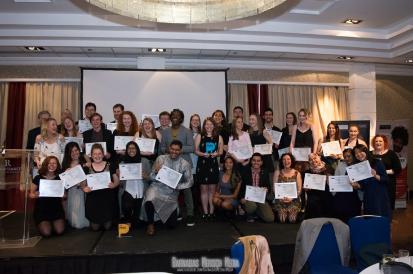TLSO Bulletin 2016/17
For details of the TLSO Bulletins issued in 2016/17, please see below:
TLSO Bulletin July 2017 - Policy on Ethical Approval of Research
July 2017 - Policy on Ethical Approval of Research on Human Subjects in Taught Assessment
The ‘Policy on Ethical Approval of Research in Taught Assessment’ was approved in June 2015, with implementation from December 2015. Following feedback received via the Teaching and Learning Management Group (TLMG) and/or the Teaching and Learning Group (TLG) in recent months, a small number of updates have been made to the Policy.
The resulting minor updates to the Policy were considered by the TLG Policy and Guidance sub-group and by Nalin Thakkar, Associate Vice-President (Compliance, Risk and Research Integrity). The updates include the following:
- clarification that the document applies to research on human subjects only (rather than animals), including a change of title to reflect this (it is now called ‘Policy on Ethical Approval of Research on Human Subjects in Taught Assessment’;
- additional wording in paragraph 4.7 relating to students’ responsibilities, particularly regarding mitigating risk and occasions where the focus of study may change;
- and highlighting the fact that advice on research ethics can be sought from Research and Business Engagement Support Services (RBESS). (Discussion had taken place about the direct inclusion of information about the Ethical Review Management (ERM) system, but it was subsequently agreed to add a general link to RBESS).
The updated Policy is available on the TLSO website, and it is envisaged that implementation of the revised version will take place from September 2017, for the 2017/18 academic year:
http://www.tlso.manchester.ac.uk/map/teachinglearningassessment/assessment/sectionb-thepracticeofassessment/ethical-approval-research/
TLSO Bulletin July 2017 - Teaching Excellence award winners 2016/17
Three winners have been selected by the panel for this year’s Teaching Excellence Awards
The panel is drawn from across the University and chaired by Professor Kersti Börjars. The winners demonstrated individual excellence, evidence of supporting and developing colleagues, impact and engagement beyond their immediate role as well as a commitment to their own development in teaching and learning.
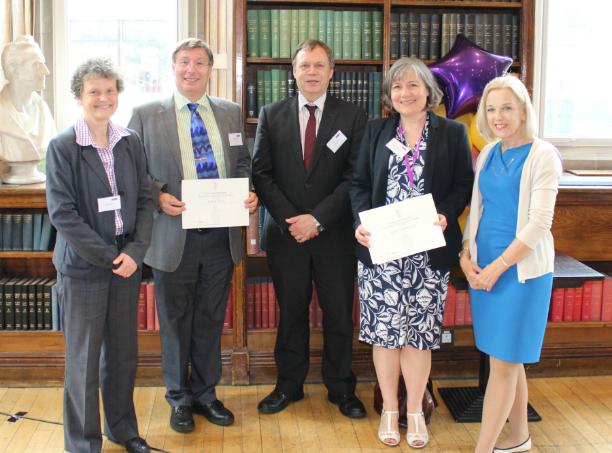
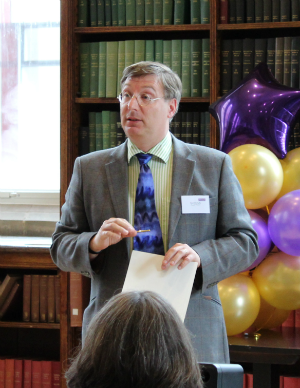
The 2017 winners are:
- Claire Fox
- Rebecca Farrington
- Professor David Schultz
The event was based on the theme of collaboration and partnered with CHERIL (Centre for Higher Education, Research Innovation & Learning) in order to share knowledge and celebrate teaching excellence. There were presentations from Staff Learning and Development team and Centre for Distance Learning on activity and future plans for these two areas. Emphasizing the collaborative theme, the Teaching Excellence Network (TEN) was also re-launched which will now act as an umbrella network to give existing teaching and learning groups a way to share knowledge and tap into expertise and knowledge in other parts of the University.
To read more about the winners and learn more about the Teaching Excellence Network go to Teaching Excellence page http://www.tlso.manchester.ac.uk/teaching-and-learning/excellence/2017winners/.
---------------------------------------------------------------------------------
If you have any queries please contact teaching.excellence@manchester.ac.uk
TLSO Bulletin July 2017
For a PDF version of the Bulletin, please see below:
1. Staffing news
- Jo Hicks joined the Teaching and Learning Support Office in mid-June in the new post of Teaching and Learning Manager (Programmes).
- Emma-Lee Yarwood and Mark Lobjoit joined the Distance Learning team in June. We welcome Jo, Emma-Lee and Mark to the TLSO.
 |
Kelly Pickard-Smith, Teaching & Learning Advisor (Innovation) recently won an award for research impact presented at the Post Graduate Summer research Showcase. Kelly won the Manchester Doctoral College Excellence Award for best contribution to society. Information about the Postgraduate Summer Research Showcase and the awards, can be found at: |
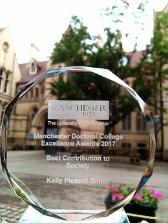 |
2. TLSO policies/procedures
- Mitigating Circumstances
During 2015/16 the Teaching and Learning Support Office (TLSO) received feedback on the then current Policy on Mitigating Circumstances and Mitigating Circumstances Panels: Terms of Reference. The Policy and Terms of Reference were subsequently reviewed again, which included extensive consultation (http://www.tlso.manchester.ac.uk/consultations/) across the University as directed by the Teaching and Learning Group (TLG).
Key changes and updates
A. Policy on Mitigating Circumstances (approved by Senate in June 2017) (http://documents.manchester.ac.uk/display.aspx?DocID=4271)
i. The Policy has been shortened and much of the procedural information has been placed in the new Procedures for Mitigating Circumstances Panels.
ii. There has been replacement of some instances of the word ‘should’ with ‘will’ or ‘must’.
iii. The ill health example of grounds for mitigation has been expanded.
iv. There has been clarification of pregnancy-related grounds for mitigation.
B. Mitigating Circumstances Procedures (approved by TLG in June 2017) (http://documents.manchester.ac.uk/display.aspx?DocID=23163)
i. This document replaces the Mitigating Circumstances Panels: Terms of Reference.
ii. There has been clarification around the involvement of the Disability Advisory and Support Service (DASS) in relation to disability-related requests for mitigation.
iii. The accepting mitigation codes have been slightly amended.
iv. The applying mitigation codes have been expanded to allow for further recommendations to be made by Mitigating Circumstances Panels.
C. DASS Guidance for Dealing with Disability-Related Requests for Mitigation (approved by TLG in June 2017).
i. This document has been produced by the DASS to clarify further its role in mitigating circumstances. It will be uploaded to the University’s website shortly.
D. Request for Mitigation Form (http://documents.manchester.ac.uk/DocuInfo.aspx?DocID=23160)
i. The Form has been expanded to include clearer separation of the sections, key principles from the Policy and Procedures, a stronger statement consent and to allow students to indicate when they believe that they may / do have a disability.
Continuing work
i. The Student Systems Office will be asked to update Campus Solutions with the revised mitigating circumstances coding.
ii. The TLSO will be working on providing more clarity around the evidence requirement for requests for mitigation, including the standing of self-certification.
iii. Mitigating circumstances is grouped into the A4 workstream on the Student Lifecycle Project.
iv. During the review above the link between religious observance and mitigating circumstances was considered and it has been noted that the University’s Policy on Religious Observance may require review.
Version control
The new policy documents come into effect from September 2017. The pre-September 2017 versions will remain available here: http://www.tlso.manchester.ac.uk/map/teachinglearningassessment/assessment/sectionc-reachingdecisionsfromassessment/policyonmitigatingcircumstances/archivedversionsofpolicy/.
- Tackling Differential Attainment for Undergraduate Students
Reports on behalf of the Higher Education Funding Council for England (HEFCE) highlight differences in outcomes and experiences for students from low socio-economic groups, disabled students, and those from black and minority ethnic groups (Mountford-Zimdars et al, 2015). Robust analysis further demonstrates these groups achieve lower rates of attainment and progression even after controlling for other potential influencing factors (HEFCE 2015/21). As is the case across the sector, these differences are evident here at Manchester, with mature students, students from low socio-economic groups, those from black and minority ethnic groups, and international students, experiencing differential outcomes.
The University is committed to ensuring that all students are able to thrive regardless of their background. This is evidenced within the Manchester 2020 strategic objectives, by identifying action on differential outcomes as a priority in both teaching and learning and social responsibility. To this end, a range of interventions have been identified to tackle this issue. The two main activities are the Differential Attainment Project commissioned by the University, and the Diversity and Inclusion Student Ambassador Programme funded through the HEFCE Catalyst fund.
- The Differential Attainment Project
|
The Differential Attainment Project intends to explore the factors that may influence undergraduate degree attainment at the University, to determine interventions that could bring about change, and to establish and oversee pilot projects testing the effectiveness of these interventions. Data compiled by the Planning Support Office has identified that the largest gap is between International and Home undergraduate students, and therefore the differential attainment project will focus its activities in this area. In addition, the Differential Attainment Project will work with the Students’ Union on projects focused on mature students and students living at home. We are working with colleagues in Schools to identify projects that will run through 2017/18 and/or 2018/19. Through the Differential Attainment Working Group we are able to offer support from the University Language Centre and the Library’s My Learning Essentials. If anyone is interesting in finding out more, please contact Emma Sanders, Teaching and Learning Adviser (Attainment Project): emma.c.sanders@manchester.ac.uk |
 |
- The Diversity and Inclusion Student Ambassador Project
The project aims to take action to improve outcomes for Black, Asian and Minority Ethnic (BAME) students, home and international and those from low-socioeconomic groups. Primarily working with second year students to create safe spaces, building supportive networks and empowering students to safely challenge racism and other forms of discrimination, the project aims to increase academic attainment, improve students’ sense of belonging, engagement, wellbeing, interpersonal skills and the ability to confidently tackle discriminatory behaviour.
The D & I Student Ambassador Project is seeking 4 Schools or Divisions with which to engage and establish a Diversity and Inclusion Student Programme during 2017-18.
Find out more about the research undertaken by the HEFCE
To find out more about this project or get involved visit the Diversity and Inclusion Student Ambassadors or contact cath.prescott@manchester.ac.uk
3. Information from other areas of the University: eLearning
- Blackboard unavailable Thursday 27 July (17:00 BST) to Sunday 30 July (09:00 BST) for Annual Upgrade
The following information is provided to inform staff members about this update:
a. Who is affected?
All staff and students.
b. What is happening?
As communicated throughout the last academic year in StaffNet (http://www.staffnet.manchester.ac.uk/news/display/?id=17369) and eUpdate, and via local faculty routes, the annual upgrade to our VLE (Blackboard) will be taking place in July. The upgrade will improve current functionality, incorporate security enhancements, performance improvements and bug fixes.
In order for this work to be undertaken, Blackboard (including Turnitin and Grademark) will be unavailable to staff and students from Thursday 27 July (17:00 BST) until Sunday 30 July (09:00 BST). Blackboard (including Turnitin and Grademark) should also be considered to be at risk until 09:00 BST on Monday 31 July. Updated information will be provided on the Knowledge Base, after the downtime.
c. Why is it happening now?
The functionality and reliability of our VLE is a high priority for the University. In response to feedback from staff and students about the scheduled downtime for Blackboard upgrades, the Online Learning Strategy Group (OLSG) agreed last year to change the timing for this year and future years in order to maximise the availability of the system to students. The downtime period is also shorter than in previous years. Your co-operation and efforts to accommodate this work are appreciated.
d. What does this mean for you?
You will not have access to Blackboard (including Turnitin and Grademark) from Thursday 27 July (17:00 BST) until Sunday 30 July (09:00 BST). Blackboard will be available for teaching from Monday 31 July 2017.
e. What do staff need to do?
Please remind your students of the downtime and ensure that any online activities you are asking students to do take into account this downtime. Please adjust any deadlines as appropriate.
We will be giving students the following advice: Plan your work to take into account the downtime and ensure you download any materials you will need during the period Blackboard is unavailable.
f. Follow-up
We will let you know about the status of the upgrade, and any new support documents developed to help you get the most out of the new features, via eUpdate and StaffNet.
Updates to existing documentation and documentation about new features, which you might wish to incorporate in your teaching for next year, will be available as soon as possible after the upgrade.
Contact for further information:
Please contact your eLearning team via the Support Centre: https://supportcentre.manchester.ac.uk/
4. Information from other areas of the University: Student Immigration Team
- Updated guidance on integrated masters course for Tier 4 visa holders (action required)
Students applying for a programme change from a bachelors course to an integrated masters can now apply for a Tier 4 visa in the UK even if they have not successfully completed their previous course. The CAS issued for any such student must state the basis for their exemption from academic progression rules. The Continuer CAS Guidance contains specific wording for students in these circumstances.
It must be a fully integrated masters course e.g. MEng, MPhys, MPharm etc. where there cannot there be the option to undertake the same courses separately.
We have created an information leaflet which we recommend be issued to students who are changing levels as part of an integrated masters course.
For details of other exemptions which allow students to apply for their visas in the UK without having successfully completed their previous course, please see our full academic progression guidance.
Full guidance regarding programme changes and when students must obtain a new visa before the course change can be applied to their record can be found here.
- British National Overseas Students
There is now a nationality code in Campus Solutions for students with British National Overseas (BNO) nationality. The code is BNO and should be used when creating a CAS as opposed to the previous system of using Hong Kong as the nationality and including an explanatory note in the offer documents section of the CAS. This is no longer required and the BNO nationality can simply be chosen in the Add/Update a Person field in Campus Solutions which should feed through to the CAS Screen.
5. Peer Support
- Training
While students were preparing to complete their final assignments and exams of the academic year, Peer Support were gearing up for a huge training period, this time targeting students who want to volunteer as a PASS Leader. From the 1st – 16th June, over 500 students attended day-long training sessions to equip them with the skills to lead study sessions and facilitate discussions with their peers. The training was very interactive and put the students’ creativity to the test; they also got to meet students from a variety of different degree programmes. This, combined with our Peer Mentor and Student Coordinator training, means that during Semester 2 over 1200 students have already trained with us ahead of the next academic year. This is a huge success for Peer Mentoring and PASS schemes at the University and also for each individual who will make a huge difference to the experiences of students who will be arriving in Sptember.
- Peer Support Practice & Progress
| This internal event, the first of its kind, was attended by student coordinators, staff coordinators and other members of staff to discuss some key areas of Peer Support practice and possible future progress. Attendees looked at the University’s Wellbeing initiative and how this is incorporated within Peer Support with a presentation from Katrina Grier, the new Wellbeing Graduate Intern. They also explored the Reward and Recognition of volunteers within Peer Support, with a presentation from Helen Franklin, Student Experience Manager for the Division of Medical Education. The final topic was titled ‘The Future of Peer Support’, hearing about new initiatives in peer-led learning with information on the SPACELESS peer-led distance learning project, a presentation on Basic Life Support from Patricia Conaghan from the Division of Nursing, Midwifery and Social Work, and a talk on higher year Peer Support from Baljit Mudhar, a Student Coordinator from Materials Science. A lot of great ideas were generated by the attendees and it will be very exciting to see how these areas of Peer Support develop in the coming months and years. | 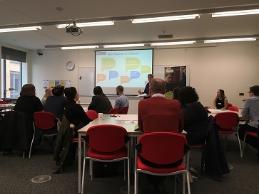 |
6. Periodic and Institutional Reviews
This month's updated review schedule for internal programmes and collaborative provision for the next six years is available below:
7. Contact
If you are aware of other staff members who would like to be added to the TLSO Bulletin mailing list to receive future editions of the Bulletin, please contact Miriam Graham (email m.graham@manchester.ac.uk).
If you are from a Collaborative Partner and you are having difficulties accessing any of the linked documents or web pages, please also contact Miriam Graham (m.graham@manchester.ac.uk).
TLSO Bulletin May 2017
|
For a PDF version of the Bulletin, please see below: 1. Staffing newsBen Bone (Teaching and Learning Assistant) left TLSO at the end of April to take up a new role in the School of Medical Sciences. We wish Ben all the best in his new post.
Dan Perry has been appointed as the new Director of Student Lifecycle Business-led Projects and will join the University in June. |
 |
2. Ramadan and formal exams
The University acknowledges that at times there may be some overlap between periods of religious observance/celebrations and examinations. This year, Ramadan is scheduled to run from 27 May to 25 June and, as such, part of it will take place in the summer exam period, which runs from 18 May to 7 June.
In order for staff members to advise students who may be affected by this (or any future similar overlap), staff are recommended to read the policy and associated supporting guidance and web links on the TLSO website.
Given that it is known well in advance the approximate dates when Ramadan will take place, the University does not accept Ramadan as a mitigating circumstance in the context of examinations. Students who believed that Ramadan would cause them to miss an examination should have filled in the Examination and Religious Observance Form and returned it by 12 February 2017.
Notwithstanding the above, should students believe that they meet the grounds for mitigation as set out in the University’s Policy on Mitigating Circumstances, they can make a mitigating circumstances application to their School and the School should consider this application as it would any other.
The Equality, Diversity and Inclusion office provides information and advice on religion and belief, which includes guidance entitled Ramadan 2015 and beyond which provides useful information for staff members on supporting students to healthily manage any overlap between Ramadan and exam periods.
3. TLSO policies/procedures
- Programme amendment form
The programme amendment form has been updated slightly to include the following:
- the addition of the reference to a resource form needing to be completed for provision that is moving to DL (distance learning) mode; and
- clarification that both institutional and School Recruitment and Admissions Offices need to be consulted if prospective students are affected.
The updated form is available on the Amendments to Taught Programmes webpage on the TLSO website.
The direct link to the form itself is: http://documents.manchester.ac.uk/display.aspx?DocID=10053
- Guidance for Continuous Monitoring
The Guidance for the Continuous Monitoring of the Undergraduate and Postgraduate Taught Student Experience and the Annual Review of Teaching and Learning, and the associated Student Experience Action Plan (SEAP) template have been updated to take into account to take into account the recommendations of the UNIAC audit of SEAPs in 2016.
The updated Guidance and SEAP template can be found on the Continous Monitoring webpage.
4. Information from other areas of the University: Student Immigration Team
- Updated Guidance on Interruptions for Tier 4 Students
The Student Immigration Team has published new guidance for staff on managing interruptions/leave of absences for Tier 4 students. The guidance makes clear our obligation to inform UKVI of any interruptions of more than 60 days and the subsequent visa implications for students. Please take the time to read the guidance on the Student Admissions and Administration intranet.
Students in this situation or who are thinking of taking an interruption from studies can find more information and guidance on the student microsite.
5. Information from other areas of the University: Manchester Institute of Education
- PGCERT in Higher Education for 2017/18
The PG Cert in Higher Education is aimed at academic staff and senior PSS colleagues at the University of Manchester. Its aim is to help you think more critically about your contribution to the University, as well as to develop a better understanding of the sector-wide changes in the Higher Education landscape. The programme is coordinated through Manchester Institute of Education and delivered by colleagues from around the University.
The programme is free to University of Manchester staff. Full details and an online application form are available on the PgCert HE website.
The deadline for applications is 30th June 2017. We will let applicants know if they’ve been successful in July.
6. Peer Support
|
The past few weeks have been a hive of activity for the Peer Support Office with some new exciting projects and some age-old traditions taking place.
An example of one of the new projects that the interns have been working on recently was planning and running the first Student Consultation session focussing on the Manchester Engineering Campus Development (MECD) Project which took place on April 27th. It was a huge success with thirty-four students in attendance, all of which were from the four schools who will be primary users of the MECD space. A further 30 registered their interest for future sessions. Students were brought up to speed with the project so far via presentations throughout the session from consultation sponsors Dr Peter Green, MECD Teaching and Learning Project Lead, and Fiona Campbell, Project Officer. The session was facilitated by Peer Support Graduate Interns Martha and Zac through a number of activities and focussed discussion questions. The students were clearly impressed by the scale and scope of the MECD project, and were pleased to hear plans for the space include 24hr access, state of the art facilities, and innovative cross-discipline collaboration opportunities. They also had many insightful questions about how the space would function, with some of their main priorities being the sustainability, efficiency, ease of navigation, and accessibility of the 75,000m2 space. The student consultants from this session will also be involved with further MECD work as the founding members of the student advisory board for MECD. A project like this really does highlight the enthusiasm of our students for enhancing their student experience for themselves and future cohorts. |
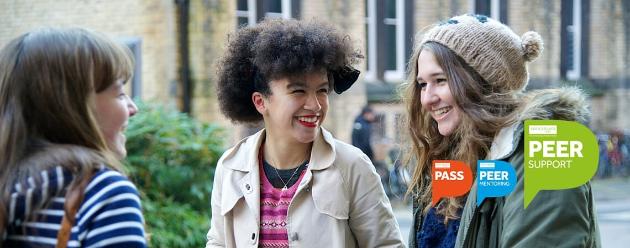 |
- Peer Support Celebration Evening
 |
This year’s annual Peer Support Celebration Evening (our 19th) took place on 4th May at the Renaissance Manchester City Centre Hotel, where the change in venue offered a chance to embrace social media, introducing a custom Snapchat filter for the evening and inject new energy through lollipop trees on the tables, a graffiti wall of students Peer Support highlight of the year and some student-led entertainment during the food which went down a storm. The evening was great fun and a chance to reward our student and staff volunteers for all they do to enhance the student experience here at the University. This year we were delighted and privileged to be joined by our Chancellor Lemn Sissay who gave an inspiring speech and presented the Outstanding Contribution awards to 35 individuals who had gone above and beyond in their role this academic year. |
This year’s winners were:
|
|
7. Great Manchester 10k run
 |
|
On the 28th May, Alana McNulty (Peer Support Graduate Intern in the TLSO) will be running the Great Manchester 10k as part of the Purple Wave. As part of this, Alana is trying to raise as much money as possible for Alzheimer’s Society, a charity that is close to her heart. To raise funds, she is running a ‘Guess my time!’ sweepstake and has agreed to personally bake a cake for whoever gets closest to the time in which she runs the 10k (lemon drizzle is Alana’s speciality)! All donations are welcome and will be much appreciated; 100% of the donations will go to the charity. To be in with a chance of winning the cake, email alana.mcnulty@manchester.ac.uk for more details, or if you would just like to make a donation and not be entered, visit Alana’s JustGiving page. Thank you in advance! |
8. Periodic and Institutional Reviews
9. Contact
TLSO Bulletin April 2017
For a PDF version of the Bulletin, please see below:
1. Staffing news
- TLSO
Fran Hooley will be covering Patricia Clift Martin’s maternity leave until 1st October 2017, as Teaching and Learning Manager (Academic Development).
John Owen and Rachel Powild will join us in April as Learning Technologists in the Distance Learning team.
- Student Lifecycle staffing news
Chris Hood joins the Student Lifecycle team on 3rd April as the Student Lifecycle Project Assistant and Cassie Barlow starts full-time (she is doing a phased start at the moment) as a second Student Services Manager after Easter, joining Jo Lowe, the existing Student Services Manager.
2. TLSO policies/procedures
- Joint Awards
The approval process for Joint Awards (for both UK and overseas awards) has been updated slightly and the details are available on the Collaborative webpages at:
3. Annual Report to Senate of Student Complaints, Academic Appeals and Conduct and Discipline Cases
The February 2017 Annual Report to Senate detailing the number of appeals, complaints, disciplinary and fitness to practice cases is now available online:
The overall number of Faculty (or equivalent) cases across the different Regulations (562 in 2015/16) remains similar to that in 2014/15 (537) and represents a small proportion of the total student population. However this should not detract from the amount of work that goes into each case at the various stages of the University.
There has been an increase in formal complaints at Faculty level (40 in 2015/16 compared with 27 in 2014/15). There has been a slight decrease in the number of academic appeals (312 in 2015/16) but within this category a rise can be seen in the number of UG appeals (234 in 2015/16).
In relation to student discipline, notable trends can be seen in the increase in examination misconduct (60 Summary Disciplinary Panel cases in 2015/16) and the increase in the University Student Disciplinary Panel considering cases of non-academic misconduct (16 in 2015/16).
Within the TLSO review cases have remained at a similar level to 2014/15, but OIA complaints have reduced from 38 in 2014/15 to 12 in 2015/16. This decrease has coincided with the extension of the OIA complaint submission timeframe from three to 12 months.
4. Peer Support
- Peer Support and Wellbeing
|
This academic year we have seen some new, and further developed, initiatives raising awareness of the ‘Manchester Ways to Wellbeing’ to Peer Support students. Some of our more recent activities are noted here. During February and March, Peer Support Interns delivered redesigned Peer Mentor training to over 400 students. During their interactive training, all students were given the task of focusing on wellbeing for both themselves and their mentees. Students were introduced to the six actions and mind-mapped all their recommendations as to how they can, as a Peer Mentor, plan a variety of activities that encourages their mentees to think about Wellbeing. A good example from a student is ‘try something new on a Saturday’, encouraging students to learn and discover more about Manchester during their time here. Peer Mentors can then organise an event on a Saturday for their group to ensure it happens! #Give #TakeNotice Peer Support has also held the second annual Dodgeball Tournament on Saturday 11th March at the Sugden Sports Centre. This was attended by 28 of our student volunteers who took time out of their busy schedules to enjoy the rounds of play with students across the University who are involved in Peer Support. After the Mechanical Engineering team were announced the winners, the Dodgeball Society organised a huge, high-energy game of dodgeball for everyone present. This closed the day on a high note with everyone able to take part and try a sport they might not necessarily think to play. #BeHealthy #BeActive Before Christmas, Peer Support introduced the concept of tagging our communications with the Manchester Ways to Wellbeing. At the end of each segment in our student coordinator bulletin, for example, there are hashtags that are hyperlinked to the Wellbeing page on the University website. Our volunteers who receive emails from us and view our social media will see how getting involved can help them improve their wellbeing, and can read in more depth about them on the website. It is a subtle signpost to give all Peer Support volunteers the opportunity to feel good by seizing different opportunities. #TakeNotice #Connect #LearnAndDiscover |
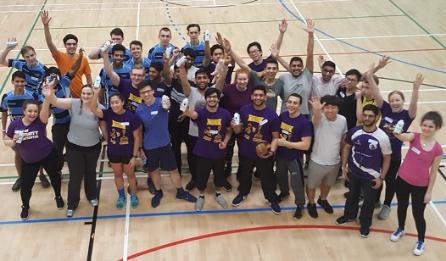 |
5. Information from other areas of the University: Student Immigration Team
- New ATAS required where course end date changes - action required
Where an international student requires an ATAS (Academic Technology Approval Scheme) certificate to study please be aware that the ATAS certificate is only valid for the length of the course (as stated on the student’s CAS) plus an additional 3 months.
A new ATAS certificate is required if a student’s course is extended by more than 3 calendar months. If the student is on a Tier 4 visa this is taken from the course end date as stated on their previous CAS.
The student must apply for a new ATAS certificate within 28 days of the course extension being applied to their record. They must provide the School with evidence of their ATAS application. If the student does not apply within this 28-day period they are not permitted to continue studying and must interrupt their studies until they can provide a new ATAS certificate in full.
Please see the Student Immigration Team intranet page for more information.
- ATAS is not just for Tier 4 Students - Reminder
Since 6th April 2015 all adults with temporary immigration permission in the UK undertaking a course longer than 6 months in duration and which requires ATAS approval need to apply for ATAS clearance, regardless of their visa category. This means that if an international student is studying a course that requires ATAS clearance they will require an ATAS certificate unless they have settled status in the UK (known as indefinite leave to remain). For example, students who are studying with a Tier 1, Tier 2, Tier 4, Tier 5, dependant visa or those who have applied for asylum, would require ATAS clearance before they start the course.
|
If colleagues are unsure of a student’s immigration status, please contact the Student Immigration Team.
We have recently updated our Continuer CAS guidance document. Please note:
The Student Immigration Team has published a guide to help Tier 4 students better understand their working conditions whilst in the UK. This includes working hours, prohibited types of work, employer checks, and working after studies. |
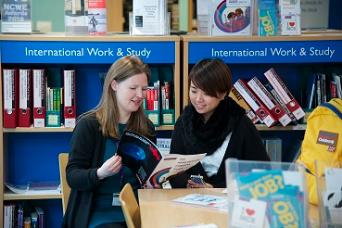 |
6. Information from other areas of the University: PGT Image Competition - Pictures tell a thousand words, why not hear what PGT students also have to say?
|
Research and Business Engagement Support Services recently launched the call for this year’s PG showcase entries for the Postgraduate Summer Research Showcase (PSRS) and, as part of this, they have also included a small image competition for PGT students. The main rationale for including a PGT competition was to encourage more taught students to come along to the showcase and give them an insight into the work of our PGR students.
For more details, please see: |
 |
7. Unit Surveys
|
We currently have students at different stages of their learning replying to one of three surveys, and from 17 April we’ll also have the Unit surveys. The National Student Survey (NSS) launched on 30 January and is running until 30 April. It captures feedback and views from final year undergraduates across eight aspects of the learning experience. The survey is a crucial source of information within the University to help us identify where we are performing well and areas where we can improve to ensure the best possible experience for our students. Results from the survey are also a key source of information used by prospective students in selecting their University choices and is published on the Unistats website. We launched the Postgraduate Taught Experience Survey (PTES) on 6 March and it will run until 12 May. This is our taught postgraduate students’ opportunity to have their voices heard, providing us with invaluable feedback that will ensure we can identify areas where we can further enhance and improve the student experience. As well as asking about overall satisfaction, the survey asks students about aspects of their course including teaching and learning, resources, and skills development. Students are also given the opportunity to give feedback on their student experience as a whole, which is extremely valuable. The Postgraduate Research Experience Survey (PRES) launched on 3 April and, like PTES, it will run until 12 May. It is a national, sector-wide survey used by individual institutions to gather information about the experience of its research students on a doctoral or research Master’s programme. The survey focuses on students’ experiences across a range of areas including supervision, resources, research community, progress and assessment, skills and professional development. Finally, the Unit Surveys are course unit evaluations for all taught students and are carried out towards the end of each semester. Any taught course unit, whether it's undergraduate or postgraduate level, is evaluated. Semester 2 Unit Surveys will run from 17 April until 9 May. The surveys are a key source of feedback on how units are running and it’s really important that students have their say. |
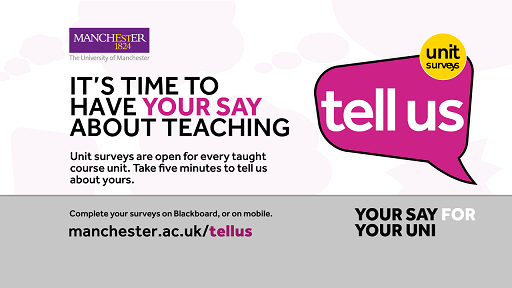 |
8. Periodic and Institutional Reviews
This month's updated review schedule for internal programmes and collaborative provision for the next six years is available below:
9. Information from the Quality Assurance Agency (QAA)
- QAA Annual Report 2015-16
The QAA’s Annual Report for 2015-16 has now been published. Throughout the year the QAA has successfully delivered a broad range of activities, working closely with the sector to maintain and enhance standards and quality in UK higher education. Internationally, their work continues to support the world-class reputation and influence of UK higher education. The report can be found at:
| 10. Contact If you are aware of other staff members who would like to be added to the TLSO Bulletin mailing list to receive future editions of the Bulletin, please contact Miriam Graham (email m.graham@manchester.ac.uk). If you are from a Collaborative Partner and you are having difficulties accessing any of the linked documents or web pages, please also contact Miriam Graham (m.graham@manchester.ac.uk). |
 |
TLSO Bulletin January 2017
For a PDF version of the Bulletin, please see below:
1. Staffing news
Will Carey (Teaching and Learning Adviser: Student Engagement) left the TLSO in November to commence in the new role of Head of Educational Engagement and Advocacy at the University of Manchester Students’ Union. We wish him all the best in his new post!
Sarah Kay joined us in December and commenced in the role of Teaching and Learning Assistant, where she is involved mainly in supporting the Peer Support strand of the office.
Patricia Clift Martin left the TLSO just before Christmas to commence her maternity leave and we are pleased to announce the safe arrival of baby Frederick in January!
Emma Sanders, currently from the Humanities Teaching and Learning Office, will join the TLSO at the end of March 2017 for a two year secondment as Teaching and Learning Adviser (Attainment). She will be working with Professor Kersti Börjars on a new project looking at attainment between different groups of taught students.
Kelly Pickard-Smith, currently a Research Associate in the School of Environment, Education and Development, will join us at the end of February 2017 to take up a new role of Teaching and Learning Adviser (Innovation), supporting the Centre for Higher Education Research, Innovation and Learning (CHERIL) and its transition into the TLSO.
2. TLSO policies/procedures
- Collaborative webpages
The webpages relating to the quality assurance of collaborative partnerships have recently been updated. The main principles remain the same but the information is a little bit more descriptive and easier to navigate. The updated webpages are available at:
- UG and PGT Degree Regulations: Marks at resit and compensation tables
A set of tables has been produced as an aid for staff members to determine how to record marks after resit/referral or when compensation has been awarded. The tables are available in the ‘Supporting documents’ section of the Degree Regulations webpage at:
3. Peer Support
- Happy New Year from Peer Support
It may seem quiet on campus as revision and January exams are underway but along with the Peer Support student volunteers we are busy preparing for the semester ahead. Some of the new and really exciting activities we are planning include:
|
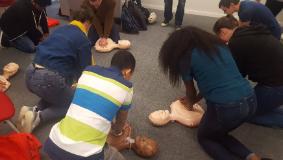 |
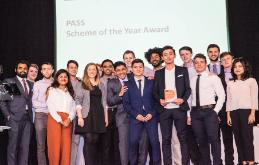 |
Alongside all these events, our student volunteers will be busy holding their own socials, activities and workshops throughout Semester 2. To celebrate all their hard work we will be holding our annual Celebration Evening on 4th May 2017. Please save the date and email peersupport@manchester.ac.uk if you would like to reserve a ticket for this event. |
4. Periodic and institutional review schedule
This month's updated review schedule for internal programmes and collaborative provision for the next six years is available below:
5. Teaching Excellence Awards 2017
Submissions are invited for the 2017 University of Manchester Teaching Excellence Awards.
|
The Teaching Excellence Awards focus on achievement in relation to teaching, learning and the student experience over recent years. A case should include evidence of an academically rigorous approach, coherence and evaluation of activity. The Award consists of a £5000 grant to be used by recipients to develop teaching and learning activities or to support their own career development in this area. The period of award is three years. The University makes around 6 awards annually and may also issue commendations at the discretion of the decision panel. Both academic and related colleagues involved in the delivery of teaching or the preparation of material for teaching at undergraduate or postgraduate levels are eligible for these awards. The awards will be decided by a panel chaired by the Vice-President (Teaching, Learning and Students) or his nominee. The panel will have representation from across the University. |
The criteria for award are:
- Individual Excellence: evidence of promoting and enhancing the student experience.
- Raising the Profile of Excellence: evidence of supporting colleagues and influencing support for student learning in (and, if appropriate, beyond) the University, through demonstrating impact and engagement beyond the nominee's immediate academic or professional role.
- Developing Excellence: the nominee's commitment to her/his ongoing professional development with regard to teaching and learning and/or learning support.
These criteria are based on the criteria used by the Higher Education Academy for the National Teaching Fellowship Scheme.
In the first instance, nominations should be sent to the listed Faculty administrative contact by the Faculty-specific date:
|
Faculty of Science and Engineering |
Rosemary Tomkinson rosemary.tomkinson@manchester.ac.uk |
Monday 27th March 2017 |
|
Faculty of Humanities |
Carol Rowlinson carol.l.rowlinson@manchester.ac.uk |
Thursday 27th April 2017 |
|
Faculty of Biology, Medicine and Health |
Wayne Bulbrook wayne.bulbrook@manchester.ac.uk |
Tuesday 25th April 2017 |
|
University Library, Cultural Institutions, Non-Faculty Professional Support Services |
teaching.excellence@manchester.ac.uk
|
Friday 28th April 2017 |
For further information on the operation of the Teaching Excellence Awards please visit the Teaching Excellence website:
http://www.tlso.manchester.ac.uk/teaching-and-learning/excellence/
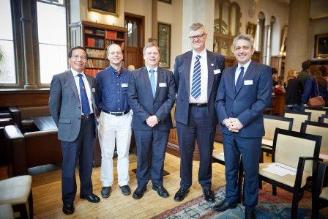
6. News from the Quality Assurance Agency (QAA)
- Consultation: Office for Students: registration fees and other fees
The Government has launched a consultation in relation to: proposals to calculate the Office for Students (OfS) registration fee; examples of where the OfS could use its power to charge other fees; and guiding principles to inform judgements about government funding to the OfS. The consultation will run until 14 March 2017. Information is available on the QAA webpage at:
- QAA Annual Conference 2017: Dimensions of Quality:9-10 May 2017 - East Midlands Conference Centre, University of Nottingham
QAA's Annual Conference 2017, Dimensions of Quality, will be held on 9-10 May at the University of Nottingham's East Midlands Conference Centre. Details of the programme and how to book will be available later this month. Places are free for QAA subscribers. Details are available at:
7. Contact
If you are aware of other staff members who would like to be added to the TLSO Bulletin mailing list to receive future editions of the Bulletin, please contact Miriam Graham (email m.graham@manchester.ac.uk).
If you are from a Collaborative Partner and you are having difficulties accessing any of the linked documents or web pages, please also contact Miriam Graham (m.graham@manchester.ac.uk).
The TLSO website is available at http://www.tlso.manchester.ac.uk/
TLSO Bulletins November 2016
1. Staffing news
Louise Walmsley has been seconded into the Student Lifecycle Project on a half time basis between 1 October 2016 and 30 September 2017. She will be working with a range of colleagues to set up the full project and to ensure engagement with Schools, Faculties and students, whilst also continuing to work on the “first adopter” pilot for the Programme that has recently gone live in AMBS.
As a result of Louise’s secondment, Emma Hilton Wood is taking on responsibility for work around ensuring the University’s compliance with the Competition and Markets Authority (CMA) guidance for higher education and the membership of some committees. Her job title will be Deputy Director of Teaching and Learning Support during this period.
Isobel Zimsek recently left the TLSO after temporarily covering a Teaching & Learning Assistant post (following her year as a Graduate Intern, Peer Support). We wish her well in her future career and travels.
Sarah Kay is due to commence working with us in late November as a Teaching & Learning Assistant, working mainly in the peer support area of the office.
2. Undergraduate Awards
Two students from The University of Manchester are celebrating, after they both scooped a global award often referred to as the ‘junior Nobel Prize’. The Undergraduate Awards are the world’s largest international academic awards programme, which recognise excellent research and original work across the sciences, humanities, business and creative arts. They are the ultimate champion of high-potential undergraduates.
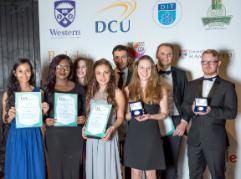 |
This year, the awards had over 5000 entries from undergraduates in 244 institutions and 121 nations – which is a record number of submissions. The ‘Global Winner’ award won by Jamie Hargreaves and Natalia Beghin is given for the highest-performing paper within its category. |
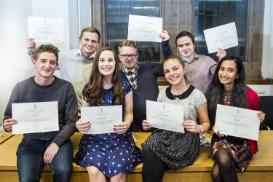 |
Jamie won the Mathematics and Physics prize for his paper, which sought to investigate the biomechanical properties of the skin and understand how to accurately replicate its behaviour – this will give insights into a range of areas, from reconstructive surgery and wound healing, to the ageing process and computer graphics.
Natalia won the Politics and International Relations prize for her paper about power structures, which used feminist theory to outline why establishing empathy for others makes it more difficult to commit violence against them.
“This is a huge achievement for The University of Manchester and its students,” said Louise Hodgson, CEO of The Undergraduate Awards. “We received the highest number of submissions to date, with only the best papers making it through the judging process - the competition was extremely tough, and the judges were astounded at the high quality of undergraduate research this year. Congratulations to this year’s successful entrants.”
11 other entrants from the University were also Highly Commended, putting them in the top 10% of submissions. They were:
- Ryan George - Business category
- Esther Olarewaju - Business category
- Veneta Haralampieva - Computer Sciences category
- Robert McCall - Economics category
- Rosie Nolan - Economics category
- Bethany Ryan - Education category
- Utkarsh Jain - Mathematics & Physics category
- Robin Trenbath - Politics & International Relations category
- Ryan Fox - Psychology category
- Ria Basu - Social Sciences: Social Policy category
- Sammy Madhi - Engineering category
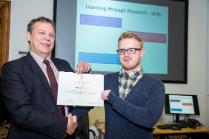 |
“Though Learning through Research aims to change the way every student approaches knowledge - rather than focusing specifically on the outcome - if we do it right, it should also result in some excellent undergraduate research. The outcome of the Undergraduate Awards shows that this is indeed the case,” said Louise Walmsley, the University’s Director of Teaching and Learning Support. “We are thrilled not just with the excellent outcomes of our global winners and highly commended students, but also with the increase in students submitting to the awards.” |
A video of Jamie’s experience can be found at:
http://www.manchester.ac.uk/discover/news/manchester-students-win-junior-nobel-prize/
3. Information from other parts of the University
- Humanities Teaching and Learning Showcase
The next Humanities Teaching and Learning Showcase will take place on Thursday 12 January 2017 in Alliance Manchester Business School East. The theme for the day will be Alternative Assessment Methods. Further details will be published on the Showcase website, when available:
http://www.humanities.manchester.ac.uk/humnet/news-events/teaching-and-learning-updates/showcase/
- Centre for Higher Education Research, Innovation and Learning (CHERIL) dissemination conference - reminder
A reminder that there are still a few places available at the second CHERIL dissemination conference: ‘Teaching and Learning in HE: are we TEF ready?’ on Wednesday 25th January 2017. This one-day event is to be centred on the 3 metrics to be used in TEF: retention, NSS (drawing on the learning environment), and employability. We demonstrate how 2015/16 CHERIL projects are contributing to a successful TEF outcome. Staff members from collaborative partner institutions are also welcome to attend.
The keynote speaker is Dr Camille Kandiko Howson, Senior Lecturer in Higher Education at King’s College, London. Camille leads the King’s Experience Internship scheme for undergraduate students and is involved in national higher education policy research on students and the student experience, working with HEFCE/DFE/HEA on Learning Gain; with HEFCE and the HEA on student surveys, including NSS and UKES; with the QAA on student engagement and student expectations; and the Leadership Foundation on academic motivation, prestige and gender.
There will be ten talks by 2015-16 CHERIL award holders, seven of which will be a short ‘Pecha Kucha’ style presentation. Q & As will follow each presentation.
Booking: The event is free but booking is essential (by 16th January 2017)
Eventbrite: Teaching and Learning in HE: are we TEF ready?
Location: Manchester Conference Centre, Weston Building, Sackville Street, Manchester, M1 3BB
Further information
To learn more about CHERIL please visit: http://www.seed.manchester.ac.uk/education/research/centres/cheril/

4. Peer Support
- National PASS Leader Conference, Bournemouth University
Throughout Semester 1, over 900 PASS (Peer Assisted Study Session) Leaders have been busy enabling the smooth transition into university life for new students as they start to grapple with new academic content. PASS Leaders have been really proactive in sharing good practice and we have seen some nice examples of collaboration between PASS schemes.
To encourage this further, three of our student PASS Leaders were chosen to represent PASS at Manchester and attend the National PASS Leader conference, this year hosted by Bournemouth University.
Our three students Laura Senior (2nd year Religions and Theology), Yu Sian Thien, (2nd year Chemical Engineering) and Melissa Stephens, 2nd year Nursing) were able to network, share good practice and learn from other PASS Leaders from other institutions. This cross-faculty representation was with a view to easily disseminate key messages and enthusiasm gained from the conference and easily spread this out to other PASS schemes within the faculties.
The 2016 conference brought together over 120 staff and students from 34 institutions across the UK, Ireland and Germany. Sessions for staff and students ran in parallel over the weekend with some joint keynote sessions. For the staff, these workshops covered a range of topics that encouraged debate and collaboration between institutions in all areas. This provoked some really useful discussion particularly around the delivery of PASS Leader training. Other universities are using some online components to training and piloting different structures. This was really helpful as we look to revamp some of our PASS Leader training and modes of delivery.
The student sessions included parallel workshops on a wide variety of topics including; advance communication skills, engagement through technology and the importance of having a vision and setting goals. The students will be working within their PASS schemes to disseminate their ideas and experiences and working with our peer support graduate interns to reach other PASS schemes who weren’t represented at the conference.
5. Unit Surveys
The semester one Unit Surveys will launch from Monday 5th December and will be open until Friday 23rd December. The surveys are sent to all undergraduate and postgraduate taught students as part of the University's commitment to listen to students, as outlined in our 2020 Vision.
Students are asked to say how far they agree or disagree with a number of general statements and then to give free text responses to questions about the unit and the lecturer for every unit they study.
The surveys will be available to students through Blackboard and the EvaluationKIT app and there will be promotion of the surveys to staff and students to try to ensure we achieve good response rates.
| If you work with students it would be really appreciated if you could encourage them to complete their Unit Surveys as this is key to the University being able to obtain important feedback about their courses. The results are used to make annual improvements in students’ experience and satisfaction with the units they study. If you have any queries about Unit Surveys, please contact: unitsurveys@manchester.ac.uk |
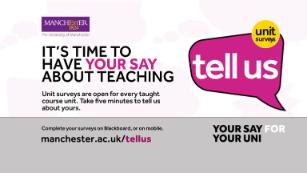 |
6. Contact
If you are aware of othe staff members who would like to be added to the TLSO Bulletin mailing list to receive future editions of the Bulletin, please contact Miriam Graham (email m.graham@manchester.ac.uk).
If you are from a Collaborative Partner and you are having difficulties accessing any of the linked documents or web pages, please also contact Miriam Graham (m.graham@manchester.ac.uk).
TLSO Bulletin October 2016
For a PDF version of the Bulletin, please see below:
1. Staffing news
Lisa Cullen (Teaching & Learning Assistant) left TLSO in September to take on the role of Peer Support Lead Administrator in the School of Medical Sciences. Wayne Eden (Teaching & Learning Advisor) has left us to take on a new position of Student Services Manager (Student Records) in the Student Systems Office. We wish both Lisa and Wayne all the best in their new roles.
2. TLSO Website / Policy & procedure changes and information
- Guidance on Late Submission
A new Policies and Guidance sub-group of the Teaching and Learning Group (TLG) has been considering the feedback received regarding the Policy on the Submission of Work for Summative Assessment. As part of this work, the Policy and Guidance Sub-Group has compiled new Guidance on Late Submission, to accompany the Policy.
Faculties are asked to distribute and commence using this guidance, to assist staff members in dealing with the administration of the sliding scale to penalise work submitted late (as per paragraph 4.7 of the Policy on the Submission of Work for Summative Assessment).
The Guidance on Late Submission is available on the TLSO website at:
Please note that the Policy and Guidance sub-group is planning to review the Policy as a whole during this academic year, so the Policy and this accompanying Guidance may be subject to change from the 2017/18 academic year.
3. Policies/guidance from other parts of the University
- Humanities Study Skills website
It has been decided that the Humanities Study Skills Site should be decommissioned this year.
Any reference to the Humanities Study Skills site within printed materials or online (e.g. programme handbooks, course unit materials, School websites etc.) should therefore be removed for the 2017/18 academic year. If appropriate, students should instead be directed to the resources available to them through My Learning Essentials, the Atrium or MyManchester.
A statement has been added to the Humanities Study Skills site to say:
“This Study Skills site is being decommissioned and will cease to be available from 31 August 2017.
For Study Skills advice and support, please see My Learning Essentials.
For general student support and advice (including Financial Advice, the Counselling Service, Careers Guidance and the International Students Office), please see The Atrium.
For advice on University procedures and systems (such as choosing course units, using the Blackboard Virtual Learning Environment etc.), please see MyManchester (for students).”
- Centre for Higher Education Research, Innovation and Learning (CHERIL) dissemination conference
Join us on Wednesday 25th Jan 2017 at our second CHERIL dissemination conference: ‘Teaching and Learning in HE: are we TEF ready?’
This one-day event is to be centred on the 3 metrics to be used in TEF: retention, NSS (drawing on the learning environment), and employability. We demonstrate how 2015/16 CHERIL projects are contributing to a successful TEF outcome.
The keynote speaker is Dr Camille Kandiko Howson, Senior Lecturer in Higher Education at King’s College, London. Camille leads the King’s Experience Internship scheme for undergraduate students and is involved in national higher education policy research on students and the student experience, working with HEFCE/DFE/HEA on Learning Gain; with HEFCE and the HEA on student surveys, including NSS and UKES; with the QAA on student engagement and student expectations; and the Leadership Foundation on academic motivation, prestige and gender.
There will be ten talks by 2015-16 CHERIL award holders, seven of which will be a short ‘Pecha Kucha’ style presentation. Q & As will follow each presentation.
Booking: The event is free but booking is essential (by 16th January 2017)
Eventbrite: Teaching and Learning in HE: are we TEF ready?
Location: Manchester Conference Centre, Weston Building, Sackville Street, Manchester, M1 3BB
Further information
The broad aims of CHERIL are:
- To provide University Senior Management with strategic advice on developments in teaching and learning across the sector
- To promote original, rigorous educational research into pedagogy, policy and practice in HE
- To promote inquiry into practice in HE teaching
- To serve institutional needs by helping University and Faculty teaching agenda to engage with day to day academic teaching practice.
To learn more about CHERIL please visit: http://www.seed.manchester.ac.uk/education/research/centres/cheril/
4. Peer Support
- Welcome and Induction
This September over 1500 newly trained peer support volunteers were involved in organising and running extensive Welcome Week activity; to both welcome their new students, and to kick start their scheme’s activity.
The aim is to raise awareness to students of peer support but also to encourage a sense of belonging and community for students at a discipline level.
This year volunteers organised tours, scavenger hunts, lunches, quizzes and other social events to welcome new students.
Some of our highlights were from Politics and International relations peer mentoring who organised a campus based welcome reception, a course unit selection drop in event, and a pub quiz with mentees, mentors and staff.
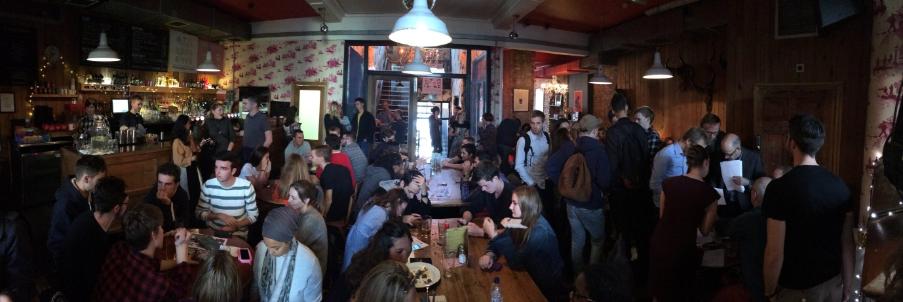
Equally, Pharmacy and Optometry PASS collaborated in organising a cake filled coffee morning in aid of Macmillan. The cake decorated with jelly bean “pills” in the shape of glasses hinted at the start of more collaboration between the two schemes. It was great to see them working closely together, as well as hearing all the positive experiences of Peer Support.
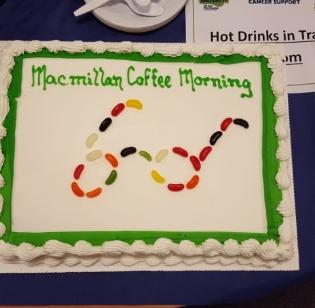
Academic year 2016/17 has already seen some great peer support activity, which is set to continue throughout the year.
5. Periodic and Institutional Reviews
This month's updated review schedule for internal programmes and collaborative provision for the next six years is available below:
6. Information from the Quality Assurance Agency (QAA)
- Plagiarism in Higher Education - Custom essay writing services: an exploration and next steps for the UK higher education sector
Cheating through the use of custom essay writing services is a worldwide problem with no single solution for combatting this form of plagiarism, finds a new report from the QAA.
Also known as 'essay mills', the report finds that these services are rife and often blatant in their offer to students. There is no specific legislation on their activity, and limited legal precedent on challenging the sites themselves or the students that use them.
Jo Johnson, Universities Minister said: 'Plagiarism is not acceptable and, on this industrial scale, represents a clear threat to standards in our universities.
'Individual institutions are responsible for spotting whether students are fraudulently passing off work as their own, and we expect them to have strong policies and sanctions in place to detect and deal with it.
'Our reforms, including the new Teaching Excellence Framework, will address this problem by incentivising all institutions to focus on the quality of teaching and to drive up meaningful student engagement, but we are looking closely at the recommendations in this report to see what further steps can be taken to tackle this scourge in our system.'
- QAA's view on the Teaching Excellence Framework
With the Government now considering responses to its Technical Consultation on how the Teaching Excellence Framework (TEF) will operate from year 2, this document highlights the key elements of the TEF policy and proposals that the QAA believes should be carried forward.
7. Contact
If you are aware of other staff members who would like to be added to the TLSO Bulletin mailing list to receive future editions of the Bulletin, please contact Miriam Graham (email m.graham@manchester.ac.uk).
If you are from a Collaborative Partner and you are having difficulties accessing any of the linked documents or web pages, please also contact Miriam Graham.

